Tell us your preferences.
Find the best builder for you.
Build a wonderful website!

Top website builder comparison chart
Top website builder picks
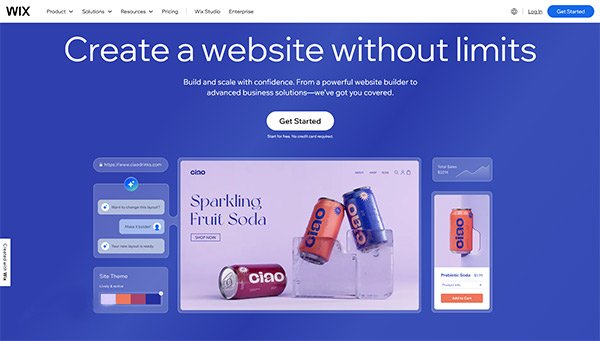
Wix has established itself as a leading website builder, offering a user-friendly platform that caters to both beginners and more experienced users. Unlike traditional web development, Wix’s drag-and-drop interface eliminates the need for coding knowledge, making website creation accessible to everyone.
Pros
Intuitive Design Interface
- True drag-and-drop functionality with precise positioning
- Rich selection of over 800 customizable templates
- Mobile-responsive designs that automatically adjust for different screen sizes
Feature-Rich Platform
- Built-in SEO tools and marketing features
- Extensive app market for added functionality
- Integrated email marketing and social media tools
- Advanced features like Wix ADI (Artificial Design Intelligence) that creates websites automatically
Flexibility
- Complete creative freedom in design
- Custom domain connection
- Built-in ecommerce capabilities
- Free hosting included
Cons
Pricing Structure
- Free plan includes Wix ads
- Higher prices compared to some competitors
- Some essential features restricted to premium plans
Technical Limitations
- Cannot switch templates after site creation
- Limited data export options
- Page load speeds can be slower than competitors
- CSS and HTML editing restrictions
Compared to Competitors
- Squarespace provides more polished templates but less design freedom
- Shopify excels in ecommerce but comes at a higher cost
Squarespace offers more professional-looking templates but less customization flexibility. While Shopify dominates the ecommerce space, Wix provides a more affordable entry point for small online stores.
Best Suited For:
- Small businesses
- Portfolios
- Personal websites
- Small to medium-sized online stores
- Beginners who prioritize ease of use
Not Ideal For:
- Large-scale ecommerce operations
- Complex web applications
- Users who need full code access
- Sites requiring extensive databases
Overall, Wix strikes a balance between usability and functionality, making it an excellent choice for users who want to create professional-looking websites without dealing with technical complexities. While it may not be the cheapest option or the most powerful platform, its combination of features, ease of use, and design flexibility makes it a solid choice for most small to medium-sized website projects.
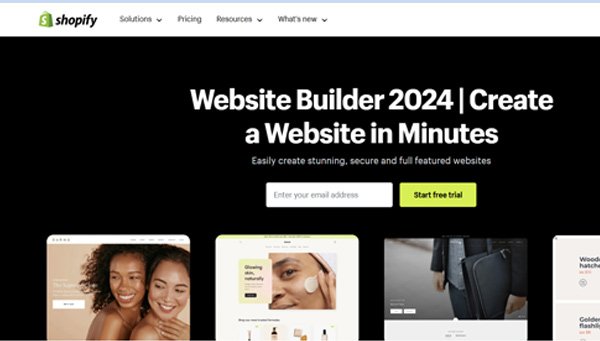
Shopify has established itself as the industry leader in ecommerce platforms, offering a robust solution for businesses of all sizes. This platform stands out for its comprehensive selling tools, scalability, and extensive app marketplace.
Pros
Ecommerce Capabilities
- Advanced inventory management
- Multiple sales channels integration (social media, marketplaces)
- Abandoned cart recovery
- Professional reporting tools
- Built-in payment processing (Shopify Payments)
Flexibility and Scalability
- Extensive app marketplace for added functionality
- Multiple sales channels (online, POS, social media)
- International selling capabilities
- Multi-currency support
- Handles high-volume sales efficiently
Business Tools
- Built-in marketing tools
- SEO features
- Analytics and reporting
- Customer relationship management
- Multiple payment gateway options
Cons
Costs
- Monthly subscription fees higher than basic website builders
- Transaction fees when not using Shopify Payments
- Premium apps can significantly increase overall costs
- Additional fees for advanced features
Customization Limitations
- Template modifications require technical knowledge
- Basic templates can look similar
- Content blogging features less sophisticated than competitors
Compared to Competitors
- More comprehensive than Wix for ecommerce but more expensive
- More scalable than Squarespace but steeper learning curve
- More powerful than BigCommerce in app ecosystem
Best Suited For:
- Dedicated online stores
- Multi-channel retailers
- Growing businesses
- Drop-shipping operations
- Physical stores needing POS integration
Not Ideal For:
- Simple informational websites
- Budget-conscious small businesses
- Content-focused websites
- Complex custom functionality needs
Shopify excels as an all-in-one ecommerce solution, particularly for businesses focused on growth and scalability. While it may not be the cheapest option, its combination of powerful features, reliability, and extensive app marketplace makes it the go-to choice for serious online retailers. The platform’s ability to handle everything from startup to enterprise-level operations makes it a solid long-term investment for ecommerce businesses.

Pros
Design Excellence
- Premium, modern templates with stunning visual layouts
- Consistent quality across all designs
- Built-in mobile responsiveness
- Advanced image editing tools and galleries
All-in-One Solution
- Integrated ecommerce features
- Built-in SEO tools
- Email marketing capabilities
- Professional Google Workspace integration
- SSL security included
Content Features
- Powerful blogging platform
- Portfolio management tools
- Social media integration
- Advanced analytics
Cons
Limited Customization
- Less flexibility compared to Wix’s drag-and-drop freedom
- Template switching can be challenging
- Limited third-party integrations
Learning Curve
- Interface not as intuitive as some competitors
- Takes time to master the platform’s features
- Section-based editing can feel restrictive
Pricing
- No free plan available
- Higher starting price than many competitors
- Some essential features restricted to higher tiers
Compared to Competitors
- More design-focused than Wix but less flexibles
- More comprehensive than GoDaddy but steeper learning curve
Best Suited For:
- Creative professionals
- Photographers and artists
- Small businesses prioritizing design
- Restaurants and service businesses
- Content creators and bloggers
Not Ideal For:
- Complex ecommerce operations
- Users seeking extensive customization
- Budget-conscious beginners
- Projects requiring unique functionality
Squarespace excels in delivering visually stunning websites with professional features, making it ideal for users who prioritize design and are willing to invest time and money in their online presence. While it may not be the most flexible or affordable option, its polished templates and comprehensive features make it a strong choice for businesses and creatives seeking a sophisticated web presence.

Hostinger’s website builder represents a newer entry into the website building market, distinguishing itself by combining hosting services with an AI-powered building platform. This integrated approach offers an interesting alternative to standalone website builders.
Pros
Value Proposition
- Competitive pricing compared to major competitors
- Hosting included in all plans
- Free domain for a year with most plans
- SSL certificates included
- No commission fees on sales
Ease of Use
- AI-powered website creation tool
- Simple drag-and-drop interface
- Mobile-responsive templates
- Quick setup process
- Website backup features
Performance
- Good loading speeds
- Built-in SEO tools
- Reliable hosting infrastructure
- CDN integration
- Regular automatic updates
Cons
Limited Features
- Fewer templates than established competitors
- Basic ecommerce capabilities
- Limited design flexibility
- Restricted third-party integrations
- Basic blogging features
Platform Maturity
- Newer platform with fewer advanced features
- Limited app marketplace
- Less extensive community support
- Fewer integrations than competitors
- Basic marketing tools
Compared to Competitors
- More affordable than Wix but fewer features
- Less sophisticated than Squarespace in design
- More integrated than GoDaddy but less established
Best Suited For:
- Small businesses on a budget
- Personal websites
- Basic business websites
- Beginners seeking simplicity
- Projects requiring hosting integration
Not Ideal For:
- Large ecommerce operations
- Complex website requirements
- Design-focused businesses
- Advanced customization needs
- Content-heavy websites
Hostinger’s website builder stands out as a cost-effective solution that combines hosting and website building capabilities. While it may not match the feature set of premium builders like Wix or Squarespace, it offers good value for users seeking a straightforward, budget-friendly option. Its AI-powered features and integrated hosting make it particularly attractive for beginners and small businesses looking to establish a basic online presence without significant investment.
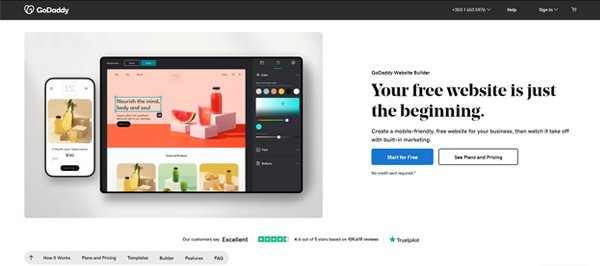
GoDaddy’s website builder has evolved from a domain registration service to a comprehensive website creation platform. Targeting small businesses and individuals, it offers a quick and straightforward approach to building an online presence.
Pros
Simplicity
- Extremely user-friendly interface
- AI-powered website creation
- Quick setup process (typically under 30 minutes)
- Guided design assistance
- Intuitive drag-and-drop editing
All-in-One Services
- Domain registration and hosting integrated
- Professional email included
- Marketing tools built-in
- Social media integration
- 24/7 customer support
Business Features
- Basic ecommerce capabilities
- SEO optimization tools
- Mobile-responsive designs
- Free SSL certificate
- Multiple template categories
Cons
Design Limitations
- Limited template customization
- Less sophisticated design options
- Templates can appear generic
- Fewer advanced design features
- Limited creative control
Performance Issues
- Slower page loading speeds
- Basic performance optimization
- Limited advanced analytics
- Higher pricing for additional features
- Transaction fees on ecommerce plans
Compared to Competitors
- Less flexible than Wix
- Less design-focused than Squarespace
- More affordable than Shopify
Best Suited For:
- Small local businesses
- Freelancers
- Personal portfolios
- Service-based businesses
- Beginners with minimal technical skills
Not Ideal For:
- Complex websites
- Advanced ecommerce operations
- Design-intensive projects
- Businesses needing extensive customization
- High-traffic websites
GoDaddy’s website builder serves as a solid entry-level solution for those seeking a quick, no-frills online presence. While it may not offer the sophisticated design capabilities of premium platforms, its straightforward approach and integrated services make it attractive for small businesses and individuals just starting their digital journey. The platform prioritizes ease of use over advanced features, making it ideal for users who want a functional website without investing significant time or technical expertise.
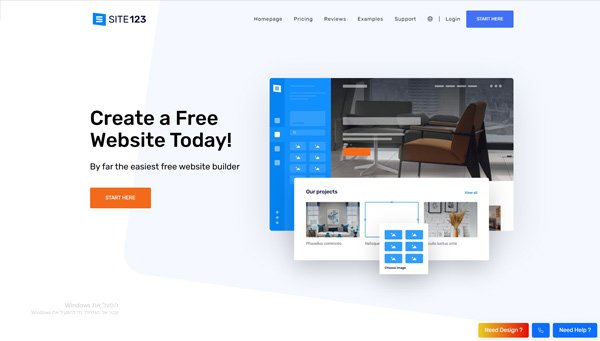
Site123 emerges as a budget-friendly, user-friendly website builder targeting individuals and small businesses seeking a straightforward online solution. Designed with simplicity in mind, it offers an accessible platform for those with minimal technical expertise.
Pros
Ease of Use
- Extremely intuitive interface
- AI-guided website creation
- No coding knowledge required
- Quick setup process
- Automatic mobile responsiveness
Cost-Effectiveness
- Free plan available
- Low-cost premium options
- No hidden fees
- Hosting included
- Free SSL certificate
Built-in Features
- Multilingual website support
- Basic SEO tools
- Simple ecommerce capabilities
- Image editing tools
- Social media integration
Cons
Design Limitations
- Limited template customization
- Generic design aesthetic
- Fewer advanced design options
- Restricted creative control
- Basic layout configurations
Functionality Constraints
- Limited third-party integrations
- Basic ecommerce features
- Minimal advanced marketing tools
- Restricted app marketplace
- Limited scalability
Compared to Competitors
- Less flexible than Wix
- More affordable than Squarespace
- Less comprehensive than Shopify
Best Suited For:
- Personal websites
- Small local businesses
- Portfolio showcases
- Simple online stores
- Beginners with minimal technical skills
Not Ideal For:
- Complex website requirements
- Advanced ecommerce operations
- Design-intensive projects
- High-traffic websites
- Businesses needing extensive customization
Site123 positions itself as an entry-level website builder focusing on simplicity and affordability. While it may not offer the sophisticated features of premium platforms, its straightforward approach makes it an attractive option for users seeking a quick, no-frills online presence. The platform prioritizes ease of use and cost-effectiveness, making it particularly appealing to individuals and small businesses looking to establish a basic digital footprint without significant time or financial investment.
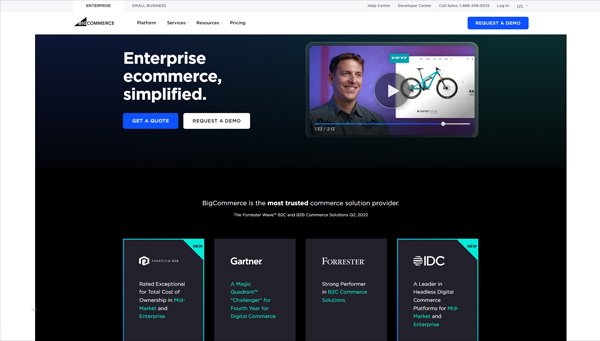
BigCommerce stands as a robust ecommerce platform designed for businesses seeking a comprehensive online selling solution. Unlike more basic website builders, it offers enterprise-level features tailored for growing and established online retailers.
Pros
Ecommerce Capabilities
- Advanced product management tools
- Multi-channel selling integration
- Unlimited products and bandwidth
- Sophisticated inventory tracking
- Built-in marketing tools
- Comprehensive payment gateway options
Performance Features
- Superior site loading speeds
- Advanced SEO optimization
- Mobile-responsive designs
- Detailed analytics and reporting
- Robust security features
Scalability
- Handles high-volume sales efficiently
- Enterprise-grade infrastructure
- Advanced B2B selling features
- International selling capabilities
- Seamless third-party integrations
Cons
Pricing Structure
- More expensive than basic website builders
- Annual sales limits on lower-tier plans
- Complex pricing tiers
- Additional costs for advanced features
Design Limitations
- Fewer design templates
- Less intuitive customization
- Limited creative flexibility
- Templates can appear corporate/generic
- Requires more technical knowledge
Compared to Competitors
- More powerful than Shopify for enterprise sales
- More comprehensive than Wix for ecommerce
- More scalable than Squarespace
Best Suited For:
- Medium to large online businesses
- Retailers with complex product catalogs
- B2B ecommerce operations
- Businesses requiring multi-channel selling
- Companies needing advanced sales analytics
Not Ideal For:
- Small startups
- Limited budget operations
- Simple informational websites
- Businesses needing extensive design customization
- Low-volume sellers
BigCommerce excels as a comprehensive ecommerce platform, offering powerful tools for businesses serious about online selling. While it may intimidate beginners with its complexity, it provides unparalleled functionality for growing businesses seeking a robust, scalable online sales solution.
Still not sure? Let us help







